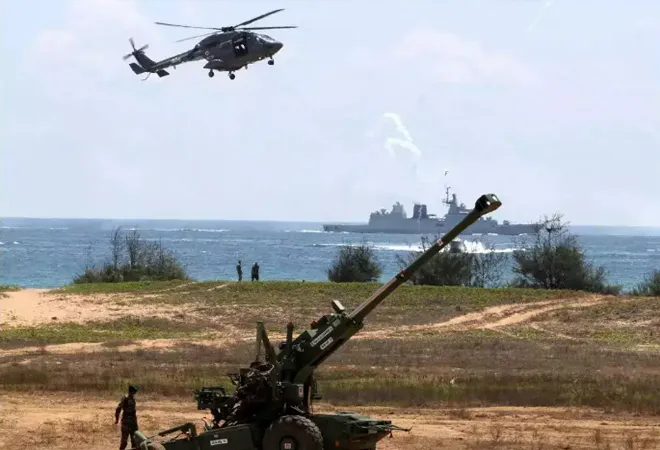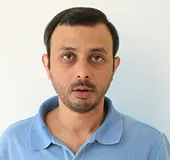-
CENTRES
Progammes & Centres
Location
To properly establish ICTs, the government needs to step in and resolve any pending issues among the three services as well as between the bureaucracy and the CDS and the services

With all three Indian armed services namely the Indian Army (IA), Indian Navy (IN) and Indian Air Force (IAF) narrowing their differences to establish Integrated Theatre Commands (ITCs), by August 2023, the country should see its first ITC under the Modi government. Additionally, it is also ripe to evaluate why theatre commands are necessary and take stock of the challenges that face theaterisation. Let us see what the results have been with regard to ITRs so far and what problems stare at them.
Firstly, the Indian Army (IA) and India Navy (IN) have conceded the Indian Air Force (IAF)’ demand that no air assets will be placed under theatre commands. Instead, they will be used in contingencies to meet the operational requirements of the ITCs, but under the command of the IAF. The IAF reasoning is that since the service only has 31 fighter squadrons against a sanctioned strength of 42 squadrons, there needs to be service-centred control of air assets. A supplementary reason for the IAF to retain control of assets is that the service believes in the “indivisibility of airpower”. This ties into the notion that air power can be used independently of sea and ground forces. It can also produce military effects yielding tangible operational outcomes independent of sea and land operations.
A supplementary reason for the IAF to retain control of assets is that the service believes in the “indivisibility of airpower”.
Balakot airstrikes carried out in retaliation for the Pulwama terror attack in February 2019 is offered as the most visible example of how and why airpower must be used independently of a Theatre Command (TC). Indeed, as former Chief of Air Staff (CAS) S. Krishnaswamy observed: “The Balakot air strike is the most unique example of professionalism demonstrated…Our Air Force was able to mount a swift operation in utter secrecy in the dead of the night…Multiple forces from different bases and Commands participated in the mission that was overseen by the Chief of Air Staff himself. It is a bit difficult to imagine such swift operations to be planned and executed in secrecy from the office of the Chief of Defence Staff (CDS) with Component Commander advising him and planning and executing the mission even if it was forked out to a Joint Command.”
Secrecy and speed which are the constituent elements of surprise, are most effective at the tactical level of military action, which is what the IAF’s Balakot air strike was all about.
The former CAS does make a valid point about the importance of speed and secrecy in planning and executing airstrike missions of the kind carried out by the IAF against the Jaish-e-Mohammed (JeM) terrorist training camp at Balakot. Although missions of this kind with a limited tactical focus or objective can be planned and executed by the service, even if it sets an unfortunate precedent, without the involvement of the theatre commander and the CDS, it cannot be a template for larger and complex conventional operations and missions. In the latter subset of military operations, joint planning, joint training, interoperability, and execution under a single commander are imperative, which is where and why the ITCs and the CDS become consequential in generating effective combat outcomes in wartime. Secrecy and speed which are the constituent elements of surprise, are most effective at the tactical level of military action, which is what the IAF’s Balakot air strike was all about. Dismissing the importance of ITCs for conventional war-fighting campaigns is unfortunate and disturbing.
The bureaucracy has its reservations and inevitably moved to secure its position, but what is overlooked in the extant analysis is the role of elected civilians playing truant.
The second challenge is that while the previous Chief of Defence Staff (CDS) the late General Bipin Rawat tried to bulldoze the decision for ITCs and even declared the IAF to be a “support arm”, deeply injuring the entrenched assumptions and views about airpower within the IAF as an independent arm of the Indian military, the civilian bureaucracy, according to one prominent assessment, stymied the efforts of the late CDS. The absence of theaterisation during General Rawat’s tenure is the bureaucracy’ growing insecurities about their place in the “Warrant of Precedence” rather than the IAF becoming a drag on the establishment of ITCs. Since all the theatre commanders will be or are expected to be four-star rank officers making them equivalent to the service chiefs and will have to report directly to the CDS who is the Permanent Chairman Chiefs of Staff Committee (COSC), there is a growing concern, especially within the civilian bureaucracy whether the Theatre Commanders (TC) elevation to four-star rank will make them outrank or supersede the Defence Secretary (DS), who is the top civilian bureaucrat in the Ministry of Defence (MoD). Undoubtedly, the bureaucracy has its reservations and inevitably moved to secure its position, but what is overlooked in the extant analysis is the role of elected civilians playing truant. The Modi government took the highly laudable and courageous decision to establish the position of a CDS and ITCs, it is they who have to assume the responsibility and burden of overcoming resistance or even “obstructionist” tactics employed by the MoD bureaucracy and more generally the Central government’s civilian bureaucracy. Otherwise, it would amount to civilian abdication by India’s democratically elected government. Civilian abdication by India’s elected leadership remains the bane of military reforms, strategy, planning, and engagement with operational military matters in post-independence India. Correcting this problem will require the Modi government to actively step in and resolve any pending issues among the three services as well as between the bureaucracy and the CDS and the services.
Kartik Bommakanti is a Senior Fellow with the Strategic Studies Programme at Observer Research Foundation.
The views expressed above belong to the author(s). ORF research and analyses now available on Telegram! Click here to access our curated content — blogs, longforms and interviews.

Kartik Bommakanti is a Senior Fellow with the Strategic Studies Programme. Kartik specialises in space military issues and his research is primarily centred on the ...
Read More +